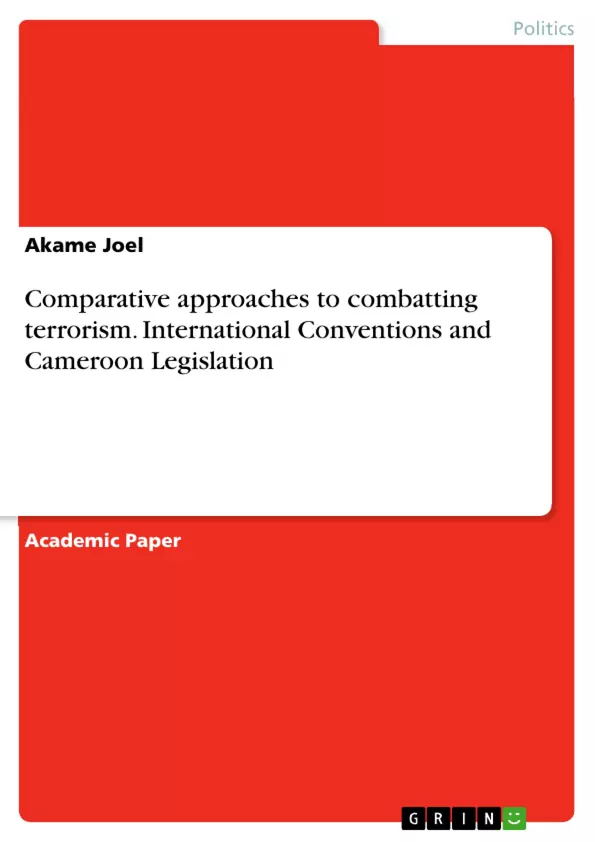This article examines the strategies employed to combat terrorism, comparing Cameroon’s legislative framework with international conventions on terrorism. Terrorism's impact is globally acknowledged, necessitating international intervention. While the phenomenon has evolved over decades, its prominence surged after the 9/11 attacks, prompting counter resolutions by the United Nations Security Council (UNSC). Terrorist activities have crossed continents, with Nigeria's military pressure on the Boko Haram group leading them to seek refuge in North Cameroon. In response, the Cameroonian government retaliated through military, administrative, and legislative measures, including the enactment of the 2014 terrorism law and addressing separatist fighters in the English-speaking regions in 2016. However, reconciling counter-terrorism efforts with human rights protection remains contentious.
This study critically evaluates both international conventions on terrorism and Cameroon's legislation on suppressing terrorist acts, analyzing their scopes and limitations. Using a qualitative research methodology, the study primarily employs doctrinal methods, consulting and analyzing primary and secondary data sources. The findings reveal that the proliferation of terrorist acts often stems from varying national definitions. Cameroon, for instance, defines terrorism based on its unique context, occasionally politicizing it to encompass acts encroaching upon civic spaces, blurring the distinction between terrorist acts and crimes punishable by the penal code.
Moreover, while significant efforts have been made to combat terrorism in Cameroon within the framework of human rights, these rights remain imperiled due to instances of extrajudicial killings, mass arrests, house burnings, arbitrary detentions, and other actions by law enforcement agencies. To address this issue, it is recommended that the government demonstrate greater commitment to upholding its ratified human rights instruments when countering terrorism, while adopting a human rights-based approach.
Inhaltsverzeichnis (Table of Contents)
- ABSTRACT
- INTRODUCTION
- I. Ratified convention on terrorism by Cameroon
- A. International Convention addressing safety of Aircraft and Aviation
- B. Conventions guaranteeing the Safety of Persons
- C. Conventions aimed at protecting Maritime sphere
- D. Convention that focuses on terrorism financing
- E. Regional African Conventions Regulating Terrorism
- II. Cameroon's Legislation aimed at combatting terrorism
- CONCLUSION AND RECOMMENDATION
- BIBLIOGRAPHY
Zielsetzung und Themenschwerpunkte (Objectives and Key Themes)
This article examines the legal framework surrounding the fight against terrorism in Cameroon by comparing its legislation with international conventions. It explores the challenges of reconciling counter-terrorism measures with human rights protection. The article highlights the need for a human rights-based approach in combating terrorism.
- Counter-terrorism measures in Cameroon
- International conventions on terrorism
- Reconciling counter-terrorism with human rights
- Cameroon's national definition of terrorism
- The impact of terrorism on civic space
Zusammenfassung der Kapitel (Chapter Summaries)
The article begins by introducing the global context of terrorism and its impact, particularly in Cameroon. It then explores the various international conventions ratified by Cameroon that address terrorism, focusing on conventions related to aircraft safety, maritime security, and terrorism financing. The article examines the strengths and weaknesses of these conventions in combating terrorism. The article concludes by analyzing Cameroon's own legislation on terrorism, highlighting its scope, weaknesses, and potential threats to civic space.
Schlüsselwörter (Keywords)
This article focuses on the key topics of terrorism, counter-terrorism, human rights, international conventions, Cameroon legislation, and the challenges of balancing security with human rights. It explores the complexities of defining terrorism and the impact of counter-terrorism measures on civic space.
- Citation du texte
- Akame Joel (Auteur), 2024, Comparative approaches to combatting terrorism. International Conventions and Cameroon Legislation, Munich, GRIN Verlag, https://www.grin.com/document/1452691



